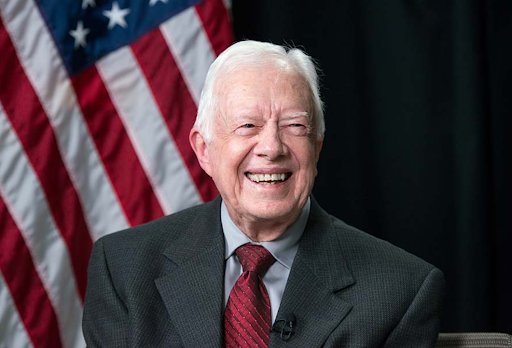As former President Jimmy Carter enters hospice care, how will his life and time in office be remembered?
Former President Jimmy Carter, pictured above, has recently entered hospice care. He leaves behind a long and positive legacy. Source for photo: The Carter Center
The 39th President of the U.S., Jimmy Carter entered hospice care in his hometown of Plains, Ga. on Saturday, Feb. 18 at age 98. He lived a long life of service and devotion to human rights and will leave behind a formidable legacy.
Carter was born in Plains, Georgia in 1924 into a family of peanut farmers. He went on to attend the Naval Academy in Annapolis, Md. and graduated in 1946. He then married his wife Rosalynn in 1946. The couple began raising their family and now have three sons and one daughter.
Carter served in the U.S. Navy until 1953, when he returned to Plains and began his political career as a community leader. He would go on to launch a campaign for the Georgia Senate in 1962 and serve in the state legislature. He then served as governor of Georgia before becoming the U.S. president in 1976. 1976.
Carter inherited a White House full of controversy and conflict. He was the first elected president to take over after the Watergate scandal and President Nixon’s resignation. Therefore, he battled deep mistrust within his constituency. Inflation and interest rates were high as a result of Nixon’s policies and foreign affairs were far from peaceful. The Vietnam War had just ended, Iran held 52 Americans hostage, and Soviet hostility was rampant.
While Carter was not popular among the public during his one term, with an approval rating of 34%, he had many notable accomplishments. Domestically, his administration established the Department of Education, passed the Alaska National Interest Lands Conservation Act aimed at national energy reform, enacted civil service reform, and improved the Social Security program. Internationally, he brokered the Panama Canal Treaties, the Camp David accords – which created peace between Egypt and Israel – the SALT II Treaty with the USSR – which limited USSR nuclear weapon development – and initiated diplomatic relations with the People’s Republic of China.
Arguably, Carter’s most significant legacy was established after he left the White House. In 1982, he founded the Carter Center. This nonprofit organization works to promote democracy and human rights and attempts to ease conflicts and infectious diseases around the world. Members of this organization have been successful in mediating conflicts in numerous places such as Haiti, Ethiopia, Eritrea, Bosnia, North Korea, and many more. They have overseen more than 100 election observation missions in the name of democracy. One of the organization's most notable accomplishments is its eradication of the Guinea worm disease which affects places without clean drinking water. Carter devoted much of his efforts to eradicating this disease that once affected more than 3.5 million people and his efforts have been victorious. In 2021, only 14 cases of Guinea worm were reported. Such work earned him a Nobel Peace Prize in 2002.
Carter has made an immense impact globally throughout his life but he will also be remembered for his devotion to serving. He taught Sunday school at his local church in Plains for decades. He and his wife Rosalyn continued to volunteer for Habitat for Humanity up until the past couple of years when his health started to decline.
In 2015 Carter had a tumor removed from his liver and later revealed he had beat the cancer entirely. However, his health has worsened since he reached his upper nineties. He has suffered several falls that required stitches in the past few years. After some brief hospital visits at the beginning of this year, the Carter family announced Jimmy would no longer receive further medical intervention and they had welcomed hospice into their home. “He has the full support of his family and his medical team. The Carter family asks for privacy during this time and is grateful for the concern shown by his many admirers.” said the Carter Center via Twitter.
Carter, the longest-living U.S. president remains in his home of Plains with his family. He will leave behind an extraordinary legacy of service to others and a devotion to human rights.
“I have one life and one chance to make it count for something... My faith demands that I do whatever I can, wherever I am, whenever I can, for as long as I can with whatever I have to try to make a difference.” — Jimmy Carter

